
GENITAL HERPES — WHAT YOU NEED TO KNOW
What is genital herpes?
Genital herpes is a sexually transmitted infection (STI). The virus is passed on through skin-to-skin contact with the affected area, usually during sex. It can lead to an outbreak of blisters in your genital area. It’s a long-term condition, so once you’ve caught it an outbreak can surface at any time.

What causes genital herpes?
Herpes is caused by the herpes simplex virus (type 1 or type 2) which can be passed through skin-to-skin contact — usually through vaginal, anal or oral sex. It gets into your body through your mouth, penis, vagina or rectum so you can also pick it up by sharing unwashed sex toys with someone who has the virus. You can still catch, or pass on, the virus even when there are no blisters or sores.
What are the symptoms of genital herpes?
Not everyone infected with the virus will show symptoms. Some people are unaware they have it at all.
The main symptoms to look out for are clear blisters that break open into painful sores. They usually affect your genitals, anus, thighs and bottom. You might also get flu-like aches and pains or find peeing painful. When an outbreak is starting, you’ll often find your skin is itchy or tingly.
How frequently you get outbreaks varies from person to person. You might get them very rarely, or experience them every few months.
How can I relieve my symptoms?
If you’ve got an outbreak right now you can use an ice pack, petroleum jelly or a pain-relieving cream to settle your symptoms. You could also bathe the area in salt water but be careful to wash your hands afterwards to avoid spreading it further. Try to keep the blisters clean so they don’t get infected. And if it stings when you pee, try pouring water over your genitals at the same time.
How can I avoid catching genital herpes?
Using condoms will help to lower the risk of infection. But because genital herpes is spread through skin-to-skin contact and the affected area might not be covered by a condom, it’s safest not to have sex at all if your partner, or you, have an outbreak. If you touch the blisters, make sure you wash your hands afterwards.
Why has my genital herpes come back?
The virus stays in your body for life. It’s inactive most of the time, but a variety of things can trigger a new outbreak. It could be an illness or stress, or it might be something more avoidable like not getting enough sleep. Over time the symptoms of your outbreaks tend to get less severe.
Get tested for other STIs
If you’ve got genital herpes you should get tested for other STIs. We offer at-home STI test kits which are a convenient, discreet way to check on your sexual health.
Getting support
Taking genital herpes suppression will reduce the chances of a partner getting the virus. But there’s still a risk that you can pass it on, even if you’re using condoms and only having sex when you’re symptom-free. If this is causing tension in your relationships, psychosexual counselling may help you. Have a chat with your GP or local sexual health clinic if you feel this could work for you.
Page last reviewed by: Dr. Christina Hennessey 21/06/2021

